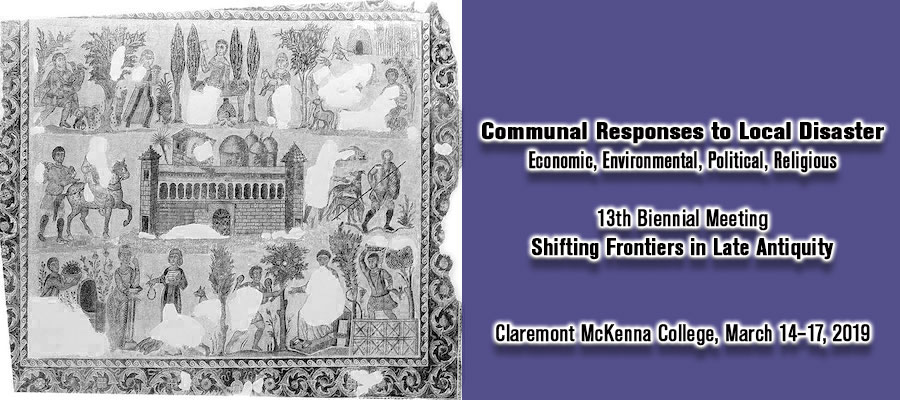Communal Responses to Local Disaster: Economic, Environmental, Political, Religious, 13th Biennial Meeting of Shifting Frontiers in Late Antiquity, Claremont McKenna College, March 14–17, 2019
The Society for Late Antiquity is pleased to announce the 13th biennial meeting of Shifting Frontiers in Late Antiquity, to be held at Claremont McKenna College, in Claremont, California. Specialists in art and archaeology, literature and philology, history and religious studies, working on topics from the 3rd to the 8th century CE, are invited to submit paper proposals. Scholars with any related interest are invited to attend.
The 2019 meeting will examine the impact of disasters on late-antique communities, including their susceptibility to disaster, the means by which they coped, and factors that increased resilience and facilitated recovery from disasters. In order to foster the thematic breadth and interdisciplinary perspective for which Shifting Frontiers is known, we invite papers concerned with the full range of traumatic events, and also long-term processes, that could distress communities: economic, environmental, political and religious. The aim of this conference is to move beyond the descriptive and stimulate analytical and theoretical approaches to understanding how distressed communities behaved in the short and long term.
Local communities developed daily and seasonal rhythms to mitigate vulnerabilities and fragility. The dread of disaster shaped the late-antique psyche and, in some ways, the cultural landscape of communities. And disasters of various kinds had a wide range of impacts, depending upon severity and the nature of communal resilience. We encourage papers to consider the extent to which the economic, cultural, political or religious resources of communities (or their lack) determined levels of susceptibility, impact, response or resilience. To what extent do late-antique sources acknowledge vulnerability and fragility? What mechanisms created durability and resilience? What were the emotional and intellectual responses to disaster? Does an awareness of the psychological impact of fragility and disaster alter our interpretation of various forms of evidence in Late Antiquity?
We are also pleased to announce that the keynote lectures will be given by Kyle Harper (University of Oklahoma) and Laura Nasrallah (Harvard University).
Potential topics include:
- Economic trauma and its impact (fiscal, commercial, etc.)
- Environmental distress and disaster relief (volcanos, earthquakes, tsunamis, etc.)
- Attitudes toward the environment owing to fragility and the potential for disaster
- Alimentary and agricultural disasters (famine, drought, interrupted shipping)
- Urban disasters (fires, rioting, siege)
- Military disasters on the battlefield
- Philosophical and ethical notions of mortality, inevitability and causation connected to disaster
- Rhetorical exploitation and literary responses to, or explorations of disaster
- Philological footprints in language and idiom related to disaster
- Representations of, and psychological responses to disaster in art
- Archaeological and architectural evidence of disasters
- Religious explanations of disaster and liturgical and cultic responses
- Differentiation between sudden, cataclysmic and long-term, slow moving disasters
- The memory of specific events
